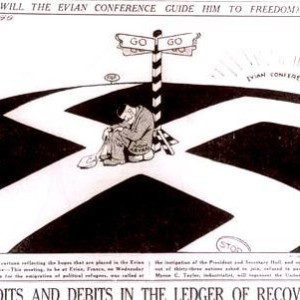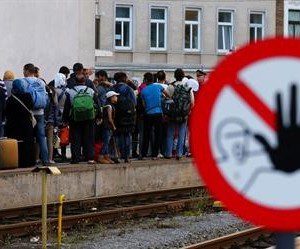


From Evian to Current Refugee Crisis

The current refugee crisis in Europe, which is being widely covered and debated both in Europe and in Israel, impelled the Massuah Institute and the Haus der Wannsee Konferenz to draft an educational program aimed at engaging with the many and varied aspects of the ‘refugee crisis’ and the discourse around it. The program covers both the historical and the sociocultural aspects.
The program is aimed at examining the historical contexts of the present-day refugee crisis, with the starting-point being the Jewish refugee crisis under the Nazi regime in 1930s Germany, and the Evian Conference in 1938. Among the pivotal questions of the program are the similar traits and the continuum ‘from then until now’ in terms of the current debate being held about the refugee issue.
The project’s goals and objectives
Creating learning materials aimed not only at exploring the historical events from a narrow perspective but as a prism for discussing questions of refugee aspects, foreignness, and otherness, as well as suggesting ways of coping with the problem of discrimination and exclusion. The project is aimed at arousing a debate on the issues involved – in terms of the citizenship values that can be learned from historical events which are relevant to our times, and the ease with which people and governments find arguments against civic human responsibility. Our aspiration was to assemble a program capable of sparking thoughts, empathy, criticism, and personal and public responsibility. The historical events and refugees’ experiences – then and now – are discussed in a broader way in the program, in the form of questions about isolating and removing, conformism and individualism, social pressure vis-à-vis autonomous discretion and critical thinking.
The program’s structure
The program we have developed consists of several units. They comprise a short opening film whose focus is the debate on the legitimacy of discussing historical topics in contemporary contexts; an introductory unit (barometer); and three units concerning historical affairs illustrating the problem of Jewish refugees in the 1930s – the Evian Conference, the MS St. Louis, and the Kindertransport.
While each unit is self-contained, at the same time we recommend using at least two units in order to intensify the educational process.
Each unit is intended to explore the historical contexts of the current refugee crisis, and to identify lines of similarity and difference between the 1930s and the present. Each unit focuses on a central question relating to Various refugee aspects.
| Unit theme | Study hours | Basic question |
| Introductory unit | 1 hour | What are the prevalent positions on the ‘refugee problem’? |
| The Evian Conference | 2 hour | Where does the balance lie between concern for self-interest (the state) and moral obligation towards refugees? |
| The Kindertransport | 2 hour | What is the meaning of being a ‘child refugee’? |
| The MS St. Louis | 2 hour | How can we create moral & emotional obligation for solving a problem I didn’t cause? |
Work process
21-26 September 2016: The staff of the Haus der Wannsee Konferenz made a major visit to Israel on the basis of a program drawn up by Massuah Institute’s educational staff (the program is attached). During the days of joint work, the participants met with researchers, Holocaust survivors, refugees, and social activists. They also attended workshops on the theme of civil education for tolerance.
30 March-4 April 2017: The staff of Massuah Institute visited Berlin, in accordance with a very well thought-out program drawn up by the staff of the Haus der Wannsee Konferenz (the program is attached). During the visit, the participants attended workshops, and also met with members of the media, refugees, and organizations working with refugees.
In the course of all the joint meetings, considerable time was devoted to reflections and discussions on developing the study units. The meetings were highly productive, and yielded creative directions for thinking which contributed to the joint work of the two groups. The final product will be uploaded on 1 March 2018.
Download Educational Resources about the Kindertransport
Download Testimonies about the Kindertransport
Download Educational Resources about The St. Louis Ship




